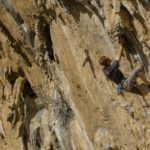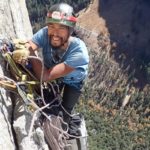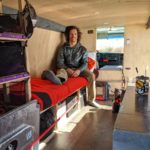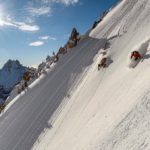I always dreamed I would be dark, brooding, self-absorbed, and climbing hard. Maybe I’ve read Mark Twight’s Kiss or Kill one too many times. I romanticized his pain, I envied his angst, I wanted his dark outlook on life. I thought being bleak, broken and angry would push me to climb harder. So I found my own inner darkness, and instead of running from it, I fed it, I nurtured it, I found sadistic joy from it.
Soon John Lydon’s piercing, unforgiving, unflinching lyrics became the soundtrack for my life:
This is what you want; this is what you get. This is what you want; this is what you get.
Is this what I want? I don’t know. I have no answers, so I climbed. I climbed to find answers, I climbed because it felt good, I climbed because I was good at it. Or did I climb because I wasn’t good at anything else?
I knew I would never climb as hard as others, so I looked down on sport climbing and bouldering, with their well-rehearsed, well-repeated, well-known beta. Climb, fall, sit on the rope, work the moves, learn the sequence, memorize the beta, clip the bolt. Copy, cut, paste, repeat. Repeat for every crux, repeat for every bolt, repeat for every climb.
I looked down on skiing, saying it was only useful as a way to get to and from a climb, thinking of it as an enjoyable rest day activity. I called myself an alpine climber. I looked at alpine climbing as the epitome of climbing, thinking of it as the be all end all. Yet I sport climbed and skied more than I climbed alpine walls. I used alpine climbing as the crutch to support my elitist attitude.
But who am I to be an elitist? What have I done that has not been done a thousand times before? I thought I could be an elitist because I had read all the right books, I knew the right slogans. I thought that because I had read about other people’s suffering, I knew what it was like, and that I too had suffered for my “craft.” Light and fast, single push, alpine style … I continuously threw these words and phrases around, and I tried to embrace their meaning, but then used discomfort as a convenient excuse to turn around.
Spouting excuses like:
Our safety margin wasn’t there
We didn’t have the gear to protect that pitch
It was too cold for what we brought
When I was safely back down in the bar drinking beer, I would blame my failures on the lack equipment, when in reality it was a lack of skill.
I would love to tell you that I saw my personal shortcomings and used them as motivation to climb a big, new route, in a ground up, pure style that simultaneously pushed my own limits. I would love to tell you that I have been to Kierkegaard’s frozen lake. I would love to tell you that I walked out onto the ever thinning ice, that I reached an indescribable moment of transcendence, and was able to bring back the jewel.
But I can’t.
I can’t, because I sit here safely on the shore of the metaphorical lake. I recount the tales of the times I tiptoed out onto the ice to my fellow beach goers. They affirm my feelings of superiority, and I theirs. We pat each other on the back, we call each other alpinists, we call each other rebels, we call each other punks on ‘pons. But we lie.
Want more climbing content? Get our awesome climbing newsletter, delivered weekly.
Explore more
- Get daily updates by Liking us on Facebook
- This week’s best rock climbing gear deals
- Everything I Learned about Redpointing I learned from Super Mario Brothers
- Nursery Rhymes, Biomechanics, and Bad Attitudes: Why I Stopped Climbing
- VIDEO: Finding Passion in a Project
- To Keep Moving Forward: How Doing Hard Things Can Help Us Heal
- What’s In Your Pack: Peter Croft on Gear and Alpine Efficiency
- BiCi Vertical Trip Report: Biking 1700km and Climbing 100 Pitches Through Patagonia
- The Dirtbag Dream, and How it Nearly Ruined Climbing For Me
- Free rock climbing PDFs on technique, training, knots, and more








